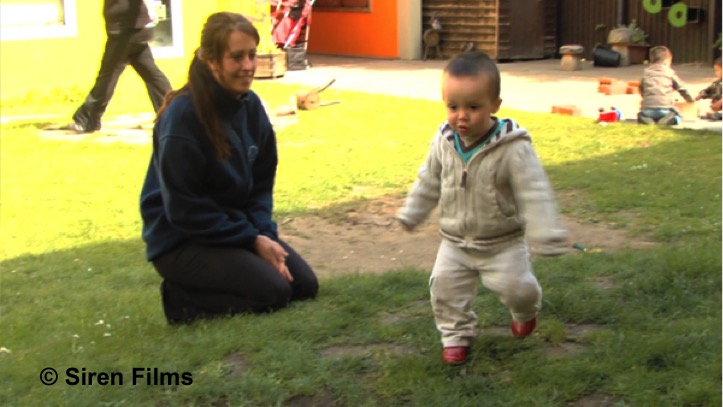Early Childhood Outdoors works with organisations and companies sharing the mission to increase the amount and quality of outdoor experience children from birth to seven have in their daily lives. Through liaising with a wide range of ‘collaborators’ our aim is to enhance each other’s work, enabling and supporting however we can.
Dipping once more into Siren Films’ multi-award winning Early Years Clip Library, we continue our collaboration with the third in a series of video clips revealing the richness of possibility available through simple outdoor experiences during the second year of life. This clip of 15 month-old Michael beautifully illustrates how being outdoors supports the neurophysiological development described in the new booklet Reasons To Be Outside (see ECO blog post 22nd May 2020).
Siren Films will be exhibiting at both the Froebel Trust/ECO ‘Birth to Two Outdoors’ research seminar on Friday 19th March 2021 and our ECO annual professional gathering in Sheffield on Saturday 20th March 2021.
Moving makes toddlers happy – and does them so much good!
You can also view the clip with its training materials on the Siren Films website
At 15 months, Michael tells us a great deal about the fundamental role of movement in the lives of toddlers. He spends much of his time outdoors moving around, but he is especially fond of going up, over and down the little hill. As he does so, he is getting vestibular stimulation through the fast motion as he runs down, aided by gravity. He gets proprioceptive input through the impact of running and falling over. He is learning about gravity and speed, and how to control his body in order to start, stop and change direction. Gently sloping ground is of far greater value for this year group than flat, rubber surfaces outside. A small hill is a fantastic feature to have in a nursery garden – digging out some soil to pile up will create a gently undulating area (ensure that drainage is good in this area). This hill is clearly very popular as the grass is worn at the top and bottom. If it is to be accessible every day, all through the year, providers must acknowledge that it will need to be maintained. Rather than preventing or limiting its use in wet winter months, it is important to consider putting aside a maintenance budget so that it can be re-turfed as necessary.

Like other children of his age, Michael incorporates lots of walking into his explorations. Movement of this kind, especially in the natural light and fresh air of the outdoors, is a very powerful mood-lifter. Movement itself stimulates the production of the neurotransmitter dopamine and activates a control centre in the brain that makes us feel alert and energised – giving that wonderful feeling of ‘life in every limb’ and leaving the mind in a ready-to-learn state (Kranowitz 2005)1. Natural light stimulates production of another neurotransmitter called serotonin which makes us feel happy, and the blue light in it helps us sleep well. The higher oxygen levels outside also contribute to feelings of wellbeing and alertness.
Notice how Vicky intuitively joins Michael when he falls over. This is a great response. Clearly he is not bothered by falling onto the soft grass, but he may well enjoy the sensations he gets from falling and landing – and she shows that she values it rather than being concerned by it. Like running up and down the hill, this too provides both vestibular and proprioceptive stimulation, adding to his body awareness, balance and control. Gentle roly-poly play is an important form of play for children under three. Many older boys enjoy on-purpose falling over and it can be a popular element of rough & tumble play. Boisterous, physical interactions with others are popular and essential ways for boys to play (Holland 2003)2. A large amount of research has shown that young children, especially boys, learn behaviour control through this form of play (Brown 2009)3.
- Carol Stock Kranowitz, The Out-Of-Sync Child: recognising and coping with sensory processing disorder (2005, Skylight Press)
- Penny Holland, We Don’t Play With Guns Here: war, weapon and superhero play in the early years (2003, Open University Press)
- Stuart Brown, Play: how it shapes the brain, opens the imagination and invigorates the soul (2009, Penguin Group)

View full clip of Michael in the Early Years Clip Library at https://www.sirenfilms.co.uk/library/play-and-learning-observation-clip-2/
This clip is part of a full-length film about Toddlers Outdoors. It is available to rent online from £15.99 at https://www.sirenfilms.co.uk/product/toddlers-outdoors/

Siren Films open Clip Library to all
This film clip and supporting materials are part of the Early Years Clip Library, an extensive collection of videos made specifically for training. Katrina at Siren Films has made the decision based on the current difficulties to support the Early Years world by offering free access to the award winning Early Years Clip Library. With over 340 training clips and six new online courses, there is something for everyone. Whether you’re a practitioner at a nursery, independent trainer, University student or lecturer or local authority the Clip Library provides resources that will fit your needs.
Further support is given to existing subscribers who would like to give remote access to their teams. Siren will add users to your account free of charge.
Due to the overwhelming response to the free trial, Siren have decided to reduce the educational package from £249 to £99 – this means that for under £100 subscribers get one trainer account and 30 FREE remote access learners accounts.
Discover more from the Clip Library (If you are not yet a subscriber to the library, these clips can be accessed with the 30 day free trial subscription) …
Why do children take risks in physical play?
All images are © Siren Films. Images must not be used without written permission from the photographer or Early Childhood Outdoors.


